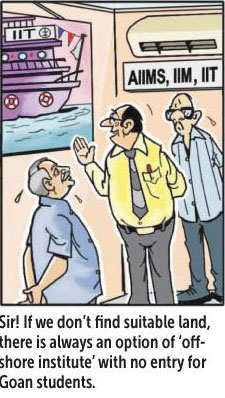
KARSTEN MIRANDA
MARGAO: Wildlife conservationists in Goa are urgently appealing to the public after a series of incidents involving injured marine wildlife along the State's coastline.
They are urging beachgoers to inform authorities immediately if they come across such cases, emphasising how crucial timely intervention is in protecting these vulnerable animals.
Goa's beaches have recently seen dozens of stranding incidents – on Wednesday alone, an Indian Ocean Humpback Dolphin calf washed up dead on Calangute beach, and a green turtle was rescued alive on the same stretch.
Earlier, a juvenile Hawksbill sea turtle on Benaulim beach was discovered on Benaulim beach. This critically endangered turtle, rarely seen along Goa's coast, was quickly taken into the care of the Forest Department for veterinary treatment.
Wildlife experts stress the importance of these turtles as keystone species, vital for maintaining the balance of ocean ecosystems, especially coral reefs.
Sadly, Benaulim beach also saw the discovery of a deceased Indian Ocean humpback dolphin in an advanced state of decomposition. These events highlight the diverse range of marine species affected by environmental pressures and human activities along the coast.
In response, wildlife activists are reminding the public that many marine species, including sea turtles, whales, porpoises, and dolphins, are protected under Schedule I of India's Wildlife Protection Act. This means handling these animals without proper training and authorisation from the Goa Forest Department is strictly prohibited.
The activists acknowledge that Goa has a structured system for responding to marine wildlife strandings. This network includes trained lifeguards who can assist and report stranding cases to the Forest Department. Additionally, the department has a dedicated marine cell and response squads that monitor the entire State coastline.
The conservationists note that the monsoon season, with its rough seas and strong winds, typically sees a higher frequency of marine stranding incidents, and call for heightened vigilance during these months.
At Colva beach, an injured Swinhoe's Storm Petrel, a pelagic bird, was reported by lifeguards and subsequently collected by the Forest Department for veterinary care. Baina beach saw two separate incidents: an injured python found under a parked boat, which sadly did not survive due to a spinal injury, and an injured olive ridley turtle that was taken for treatment.
One positive development highlighted by the activists is the improved handling and care procedures now being implemented. They cite a recent example from Baina beach, where a proper veterinary setup was established for the handover of injured wildlife to Reefwatch and the Forest Department. The activists praise the progress made in training Forest Department staff to use safety gear such as gloves and proper bird cages for animal transport.
However, the conservationists argue that more needs to be done to ensure long-term solutions for wildlife care in Goa. While acknowledging the efforts made so far, including the purchase of dedicated vehicles by the department, they stress the need for the State to invest in permanent infrastructure for wildlife veterinary services.
Currently, such services are primarily available for marine life, largely funded by collaborating NGOs.
The activists have called upon the State government to take up wildlife care as a flagship initiative, building on the successful marine animal rescue network. They envision a comprehensive system that covers all wildlife in the State, with the government taking the lead while involving expert organisations.
